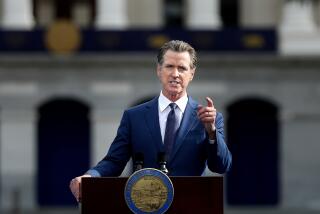SEC Chief Pushes for Proposed Audit Panel
- Share via
WASHINGTON — The nation’s top securities regulator Thursday sought to convince Congress that a proposed new accounting board would have the authority to improve industry oversight.
But Securities and Exchange Commission Chairman Harvey Pitt, testifying before a Senate committee, stood by his previous proposal that the new board include members from the accounting profession.
Pitt said the industry members would be a minority on the board, but rival proposals call for a board with no industry ties. The Public Oversight Board, which now helps oversee the profession but is disbanding at the end of the month in protest of Pitt’s plan, has called for the establishment of a new watchdog panel that would be totally independent of the industry.
“We think it ill-advised to exclude them completely,” Pitt said in written testimony to Congress.
He said his proposed Public Accountability Board would undertake quality-control reviews to ensure that audits meet high professional standards. Board members would initially be selected by the SEC, and those added later would be subject to SEC review.
The board would be funded by fees paid by auditing firms and by public companies. By contrast, the current Public Oversight Board is funded by the American Institute of Certified Public Accountants.
Among other disciplinary powers, the new panel would have the authority to force a company to change auditors, Pitt said.
The SEC chairman’s appearance before the Senate Committee on Banking, Housing and Urban Affairs comes at a critical moment for the accounting profession. Last week, federal prosecutors announced a criminal indictment of accounting firm Andersen on a charge of obstruction of justice connected to the shredding of Enron Corp.-related documents.
Lawmakers are urging Pitt to move as fast as possible to restore public and investor confidence in a profession that is one of the cornerstones of the financial markets--certified public accountants.
“The ‘P’ in CPA was put there for a purpose,” Sen. Christopher J. Dodd (D-Conn.) told Pitt.
Dodd quizzed Pitt about a proposal to limit the movement of independent auditors into jobs at client companies--a practice he suggested could create conflicts.
“I’m troubled about the so-called revolving door,” Pitt said, but he added it is “impossible for any of us to write a rule that will deal with every set of circumstances.”
Pitt again urged Congress to avoid proposals to ban accounting firms from offering consulting services to publicly held companies they audit. “To create an ‘audit-only’ firm does not guarantee an ‘audit failure-free’ future,” he said.
Andersen was both consultant and auditor for Enron at the same time, an arrangement that critics say led to a conflict of interest that ultimately may have delayed the timely disclosure of the energy trader’s financial weakness.
Pitt said that a blanket ban on consulting by auditors would backfire, but he acknowledged some limits would be useful. The proliferation of auditor-consultants “can, and in a number of situations clearly does, create conflicts that we ought to eliminate,” he said.
Also Thursday, a Senate panel said it will subpoena more records from Enron and Andersen to document contacts the two firms had with the White House and federal agencies. The Governmental Affairs Committee will send the subpoenas to both companies and to 27 current and former members of Enron’s board since 1992, Leslie Phillips, spokeswoman for Chairman Joseph Lieberman, said.
Bloomberg News was used in compiling this report.
More to Read
Sign up for Essential California
The most important California stories and recommendations in your inbox every morning.
You may occasionally receive promotional content from the Los Angeles Times.













